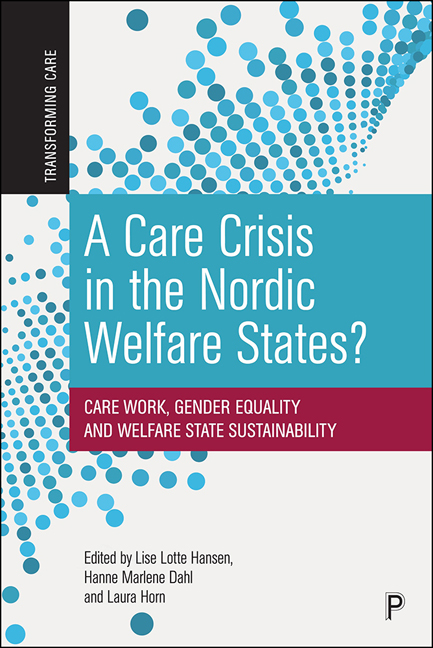 A Care Crisis in the Nordic Welfare States?
A Care Crisis in the Nordic Welfare States? Book contents
- Frontmatter
- Contents
- List of tables
- Notes on contributors
- Preface
- 1 Introduction: A care crisis in the Nordic welfare states?
- 2 The ‘care crisis’: its scientific framing and silences
- 3 Fraser’s care crisis theory meets the Nordic welfare societies
- 4 Crisis of care: a problem of economisation, of technologisation or of politics of care?
- 5 Deteriorating working conditions in elder care: an invisible crisis of care?
- 6 Managerialism as a failing response to the care crisis
- 7 ‘We are here for you’: the care crisis and the (un)learning of good nursing
- 8 Professionalisation of social pedagogues under managerial control: caring for children in a time of care crisis
- 9 Raising quality in Norwegian early childhood centres: (re)producing the care crisis?
- 10 Conclusion: Less caring and less gender-equal Nordic states
- 11 Postscript: A care crisis in the time of COVID-19
- Index
4 - Crisis of care: a problem of economisation, of technologisation or of politics of care?
Published online by Cambridge University Press: 13 May 2022
- Frontmatter
- Contents
- List of tables
- Notes on contributors
- Preface
- 1 Introduction: A care crisis in the Nordic welfare states?
- 2 The ‘care crisis’: its scientific framing and silences
- 3 Fraser’s care crisis theory meets the Nordic welfare societies
- 4 Crisis of care: a problem of economisation, of technologisation or of politics of care?
- 5 Deteriorating working conditions in elder care: an invisible crisis of care?
- 6 Managerialism as a failing response to the care crisis
- 7 ‘We are here for you’: the care crisis and the (un)learning of good nursing
- 8 Professionalisation of social pedagogues under managerial control: caring for children in a time of care crisis
- 9 Raising quality in Norwegian early childhood centres: (re)producing the care crisis?
- 10 Conclusion: Less caring and less gender-equal Nordic states
- 11 Postscript: A care crisis in the time of COVID-19
- Index
Summary
Introduction
The question of care, and how to organise it, is globally pertinent and touches not only gendered care and dependencies, but also ethics of care, reflected in the ways in which care is governed and what becomes emphasised in the analyses. Societal discourses on the governance of care revolve around the issues of quality (ethics), costs (economy) and remedies (technology). The three discourses hold separate realms in research but enmesh in everyday life, visible for example in the reactions, actions and repercussions in the current COVID-19 pandemic. Globally, the COVID-19 crisis societal discourses seem to constitute three differing logics: the costs to economies due to lockdowns and restrictions; the costs to citizens’ health and lives due to loosening restrictions; and the restoration of ‘normality’ by vaccination as remedy. Ethics cut through these discourses by questioning, for example, the values in the political decisions and the politically set national priorities and reactions.
Seeing care as an ‘informal’ or ‘formal’, or ‘market’ or ‘non-market’ activity aligns with other societal contracts and arrangements that are part of societally accepted patterns, cultures, policies and gendered social contracts (Kovalainen, 2004), but also vehicles for transferring embedded discriminatory and/or unequal practices and processes. With the emergence of market governance mechanisms, the categories of ‘public’ and ‘private’, and formal and informal, are blurred and fluid. The bending of boundaries in the organisational and institutional arrangements is reality (for example Kovalainen and Sundin, 2012; Sandberg and Elliott, 2019). The creation of quasi-markets (for example Le Grand and Bartlett, 1993) intensified ‘marketisation’, that is, the adoption of market as a governance form in the public sphere. This ‘market making’ is just one example of the processes of economisation. ‘Economisation’ refers to the economic instrumental rationalities, processes and practices that increasingly rule social life – and even research (for example Calışkan and Callon, 2009; Fraser, 2014; Vogel, 2018; Wenzlaff, 2019). ‘Financialisation’ for its part follows economisation and banks on capital formation: in care, it can range from global investment funds acquiring private care homes (Horton, 2017) to the attempts to standardise care as private equity and transform care into a tradable asset. In this process, technologies align with financialisation.
- Type
- Chapter
- Information
- A Care Crisis in the Nordic Welfare States?Care Work, Gender Equality and Welfare State Sustainability, pp. 60 - 79Publisher: Bristol University PressPrint publication year: 2021
